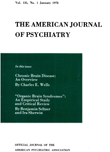Cortisol, growth hormone, free fatty acids, and experimentally evoked affective arousal
Abstract
Eight male volunteers who viewed selected control, suspense, and erotic films experienced significant changes in affect that were limited to fatigue, anxiety, and sexual arousal, respectively. All subjects showed free fatty acid elevations with the suspense and erotic films and those subjects with the most anxiety and sexual arousal showed cortisol elevation with the suspense and erotic films, respectively. Growth hormone elevations occurred independently of cortisol elevations and were not clearly related to film or affect. Thus, activation of the pituitary-adrenocortical and sympathetic nervous systems appears to occur not in relation to a specific dysphoric state but rather with nonspecific affective arousal.
Access content
To read the fulltext, please use one of the options below to sign in or purchase access.- Personal login
- Institutional Login
- Sign in via OpenAthens
- Register for access
-
Please login/register if you wish to pair your device and check access availability.
Not a subscriber?
PsychiatryOnline subscription options offer access to the DSM-5 library, books, journals, CME, and patient resources. This all-in-one virtual library provides psychiatrists and mental health professionals with key resources for diagnosis, treatment, research, and professional development.
Need more help? PsychiatryOnline Customer Service may be reached by emailing [email protected] or by calling 800-368-5777 (in the U.S.) or 703-907-7322 (outside the U.S.).



